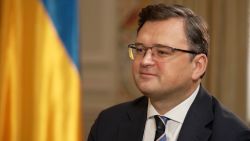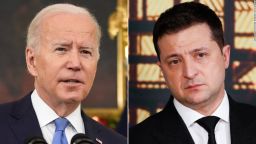New signs of a fracture between the US and Ukraine over the imminence of a possible Russian invasion could seriously undermine President Joe Biden’s muscular front against Vladimir Putin in their escalating standoff.
Frustration in Kyiv has mounted in recent days over escalating US rhetoric on the crisis, even as Moscow pours more troops into positions near the Ukrainian border. Washington and its allies have been waging an unusually open and vocal public relations warfare campaign – an approach that primarily appears rooted in genuine fears of a major conflagration in Ukraine.
But there are clear signs that the strategy is also designed to pile pressure on Putin and to sharpen his strategic dilemma while compelling US allies in Europe into taking tougher stands. It may offer political cover to Biden by showing that he was not caught off guard if Russia does invade. The strategy also shields a President, who is wobbling at home, from attacks by Republican hawks keen to portray him as a weak appeaser ahead of midterm elections.
Yet it also threatens to cause a clash between the wider interests of Biden and those of Ukrainian President Volodymyr Zelensky, who is trying to maintain calm at home even as he tries to enlist international arms and support for his country’s defense.
A telephone call that ‘did not go well’
A call between Zelensky and Biden on Thursday should have been used to get on the same page. But the Ukrainians made it known ahead of time they would ask the US President to tone down his rhetoric. After the leaders spoke, a senior Ukrainian official told CNN’s Matthew Chance in Kyiv that the call “did not go well” and that Zelensky had asked his US counterpart to “calm down the messaging” while arguing the Russian threat was still ambiguous.
According to the Ukrainian official, Biden warned an invasion was now virtually certain once the ground freezes in February, making it more passable for military vehicles. National Security Council spokesperson Emily Horne disputed the account of the call and said “anonymous sources are ‘leaking’ falsehoods.” She noted that Biden had warned that a February invasion was a possibility, a position she said he had adopted for months.
Zelensky’s spokesman also disputed the Ukrainian official’s characterization of the call. The Ukrainian President himself tweeted that he and Biden had a long call and “discussed recent diplomatic efforts on de-escalation and agreed on joint actions for the future.”
Whatever the specifics of the private conversation, it is no secret that the US and Ukraine have been publicly at odds over the scale of the threat. The government in Kyiv was, for instance, taken by surprise earlier this week when the State Department said it would reduce staff levels at the US embassy, beginning with the departure of nonessential staff and families of diplomats.
Zelensky told journalists in Kyiv on Friday that the decision by the US and UK to withdraw some staff from their embassies in the capital was a “mistake.”
“I think it was a mistake,” the Ukrainian President said. “I say this openly.”
Zelensky added that he thought American and British diplomats should stay in Kyiv, comparing them to ship captains, who in his view should be the last ones to leave.
“These are the captains of the diplomatic corps, they’re the representatives of their respective countries,” he explained. “And the captains are the last who should be leaving the ship,
He continued: “I don’t think we have a Titanic here; Ukraine is moving forward.”
Thisdisconnect is notable between two friendly governments and reflects the extreme high stakes of the moment. It’s also an odd public drama since a nation under apparently imminent threat of an invasion has a lower assessment of its own vulnerability than the United States, which has marshaled an international effort in its defense. Most damagingly, signs of a public disagreement between Biden and Zelensky would play directly into Russian hands. Moscow has already highlighted Ukraine’s more temperate position to argue that Washington is exploiting the country to escalate against Russia. In fact, the opposite is the case, with Putin holding Ukraine hostage in a bid to wring concessions from Biden that would change post-Cold War Europe.
Suggestions that the US and Ukraine are on a different page on the likelihood of a Russian attack might also cause political problems for Biden back home – from critics on the radical wings of both political parties who have criticized his hawkish approach. After all, why should the United States be more worried about the security of a country in Russia’s backyard than its own leader is?
Information warfare
As Russia has built up its massive force around Ukraine, the United States has responded by deploying information warfare against a proven master of the genre – Putin. Biden and his aides have not pleaded with the Russian leader not to invade. They have instead said repeatedly that they think he will do so and used the word “imminent.”
The Pentagon said Thursday that Russia had poured more troops in to the region in the previous 24 hours. Last week, Britain released intelligence that it said showed Putin was trying to replace the Kyiv government with a puppet regime, bolstering US warnings that Ukraine is in immediate danger. In another development on Thursday, the Center for Strategic and International Studies think tank released open source satellite imagery and analysis on the Russian build-up. This kind of information offensive from Washington is not the typical approach to a standoff with a foreign power. So it’s raised questions about the administration’s intentions.
The first explanation is that the US actually believes what it is saying – that Russian tanks could soon start rolling in one of the most serious threats to an independent nation in greater Europe since World War II. While direct clashes between US and Russian forces are unlikely, there would be global implications from such a conflict. The principle would be established that powerful autocracies could swallow smaller democracies. Reverberations between the US and Russia, possibly including cyber exchanges, could follow. All of that would explain why the administration is working so hard to put the world on notice.
Democratic Sen. Jeanne Shaheen of New Hampshire co-led a bipartisan delegation to Kyiv last week. She told CNN on Thursday: “I believe the threat is very real and could happen at any time based on the information that I’ve seen.”
Pressure on Putin
Washington may also be driven by a desire to deprive the Russian leader of any element of surprise for his mobilization. If Moscow does invade, or bites off another chunk of Ukrainian territory to add to its 2014 annexation of Crimea, the administration’s urgency will have been vindicated. If Putin eventually backs down, Biden can argue that his strong stand worked, and the Russian leader may look diminished in the eyes of the world. But the strategy also risks putting the Russian leader into a corner and could force him to act to save his strongman image.
While praising Biden for refusing to accept Russian concessions, Thomas DiNanno, a former senior State Department arms control official in the Trump administration, said it might be wise to cool the language.
“I would encourage the administration to return to the notion of strategic ambiguity, you know, don’t tip your hand. And I think maybe they’ve done that a little bit too aggressively,” DiNanno, now with the Hudson Institute, said on CNN “Newsroom” on Thursday.
One reason why Biden and Zelensky’s messages are clashing is that they are addressing different audiences. Biden is speaking to Russia, Europe and the American people. Zelensky is trying to guard against panic at home. He responded to previous warnings by the US that an invasion could be imminent by telling his people to take a deep breath and to stay calm. Yet his aides may have seriously erred in their readout of the Biden call. The US President has stuck his neck out to support Ukraine. Embarrassing him is no kind of payback and Zelensky risks his own stature in Washington.
More importantly, Russia will take advantage of such splits.
“I am a little bit worried that disclosing a lot of this in the public is not going to help anything, it will help just Mr. Putin,” John Tefft, a former US ambassador to Moscow, said on CNN’s “Erin Burnett OutFront” on Thursday.
Upping the heat on Europe
Robust American rhetoric on the crisis also appears to have another purpose – convincing America’s less hawkish European allies that their own security is at risk.
To begin with, the US approach only exposed transatlantic differences. Biden was criticized last week by Republicans for suggesting that allies might not back a full implementation of sanctions in the event of a “minor incursion” by Russia into Ukraine. But he was telling the truth. In another sign of discord, French President Emmanuel Macron called for a European Union channel to Moscow. The head of Germany’s Navy had to resign after remarks sympathetic to Putin.
But Biden’s strong line now appears to be working. EU Commission President Ursula von der Leyen told CNN’s Christiane Amanpour Thursday that “nothing was off the table” including killing the Nord Stream 2 pipeline project designed to bring Russian gas to Europe and the removal of Russia from the SWIFT financial transfers system. And Germany’s new foreign minister, Annalena Baerbock, said Berlin was working on strong sanctions should Russia invade Ukraine – including on Nord Stream, a shift in a previous German position. Biden announced on Thursday that new German Chancellor Olaf Scholz will visit him at the White House next month in a further sign of a converging position.
Still, the US diplomatic effort also reflects Putin’s underlying advantage. He knows his own mind and few others do. The question will soon start to be asked how long the United States can continue to warn that an invasion that doesn’t come is “imminent.” Prolonging the alert might eventually open up new divides between the US and Ukraine and Washington and its European allies.
And Putin may spot an opening.
CNN’s Jeremy Herb, Matthew Chance, Jim Sciutto and Vasco Cotovio contributed reporting to this story


















